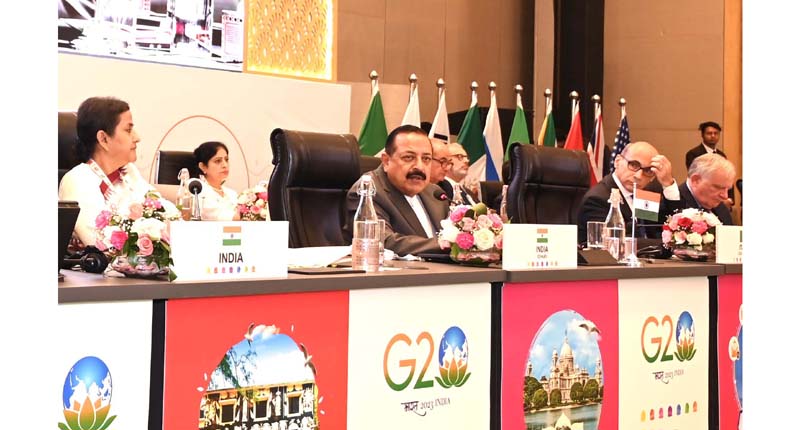Excelsior Correspondent
KOLKATA, Aug 12: Addressing the G20 Ministerial meet here today, India’s Minister In-charge Personnel and Administrative Reforms, Dr Jitendra Singh reiterated India’s crusade against corruption and underlined Prime Minister Narendra Modi’s call for zero tolerance against corruption. He also recalled the 9 point agenda on fugitive economic offenders presented by PM Modi to G20 in 2018.
The Minister said, the G20 Anti-Corruption Ministerial meeting is an opportunity for all of us to demonstrate collective and strong political will to lead the global fight against corruption. India’s zero tolerance approach for corruption also guides our approach towards international cooperation for combating corruption, he said.
The Kolkata Ministerial comes on top of the 3rd and final meeting of G20 Anti-Corruption Working Group (ACWG) under India’s Presidency held from 9-11 August 2023 in Kolkata.
Dr Jitendra Singh said, “I am impressed by the efforts put in by G20 ACWG members in updating the guides related to asset recovery and mutual legal assistance which will enhance the utility of existing knowledge resources. I also welcome work towards finalisation of the Accountability Report on a very important subject of Mutual Legal Assistance. Its findings and recommendations would be very useful in improving and strengthening cooperation between countries in combating transnational crime and maintaining global security. These are important steps towards dealing with the menace of Fugitive Economic Offenders,” he said.
He said, fugitive economic offenders pose a significant challenge to both national and international law enforcement as they are able to exploit gaps and differences between legal and financial systems of countries to evade justice.
“Fugitive Economic offenders commit grave economic crimes in their home country and flee to another country to avoid arrest, prosecution, or the execution of their sentence. Economic crimes include a wide range of illegal activities such as fraud, tax evasion, money laundering, and embezzlement. Their actions undermine the rule of law, hamper economic development, and often contribute to corruption,” he said.
Dr Jitendra Singh referred to the 9 point agenda presented by PM Modi. “It called for strong and active cooperation across G20 countries in legal processes and mechanisms to deny safe haven to all fugitive economic offenders, effective implementation of international commitments, establishment of international cooperation for timely and comprehensive exchange of information and formulation of a standard definition of fugitive economic offenders, development of a set of commonly agreed and standardised procedures for dealing with fugitive economic offenders by the Financial Action Task Force (FATF), setting up of a common platform for sharing experiences and best practices and initiation of work on locating properties of economic for its recovery,” he said.
Lauding the G20 ACWG for publishing an important G20 Action paper on International Cooperation dealing with Economic Crime, Offenders and Recovery of Stolen Assets in 2020, Dr Jitendra Singh said, it underscored the commitment of G20 countries to make efforts towards the denial of safe havens and facilitate the return of such fugitives and recovery of stolen assets.
“Corruption can be countered by harnessing technology to enhance transparency and by fostering a culture of active citizen participation. I welcome the efforts of all G20 members to highlight the role of Information and Communication technology in preventing and combating corruption. By modernising governance, improving efficiency, and enhancing service delivery, these tools offer pathways to minimise corrupt practices,” he said.
Pointing out that corruption undermines democracy and the rule of law, Dr Jitendra Singh said it perpetuates inequality and erodes public trust in institutions.
“Corruption disproportionately affects the poorest and most marginalised members of society. Corruption also fuels transnational crime and terrorism by enabling illicit flow of money, and even directly financing criminal groups, which has direct bearing on the national security of countries. All the countries of the world face the negative impact of corruption in one way or the other,” he said.
“Let us commit ourselves to this cause and create societies where prosperity and justice are not undermined by the scourge of corruption,” said Dr Jitendra Singh, adding, “We have the tools, the technology, and most importantly, the collective will to combat it. What we need is to convert this will into concerted, global action.”
Dr Jitendra Singh said the fight against corruption is all the more important in our times since the world is confronted with unparalleled and diverse challenges today, including COVID pandemic, supply chain disruptions, geo-political conflicts, and climate-related incidents.
“All these have derailed the progress and development achieved by the world in the past,” he said.
Trending Now
E-Paper


